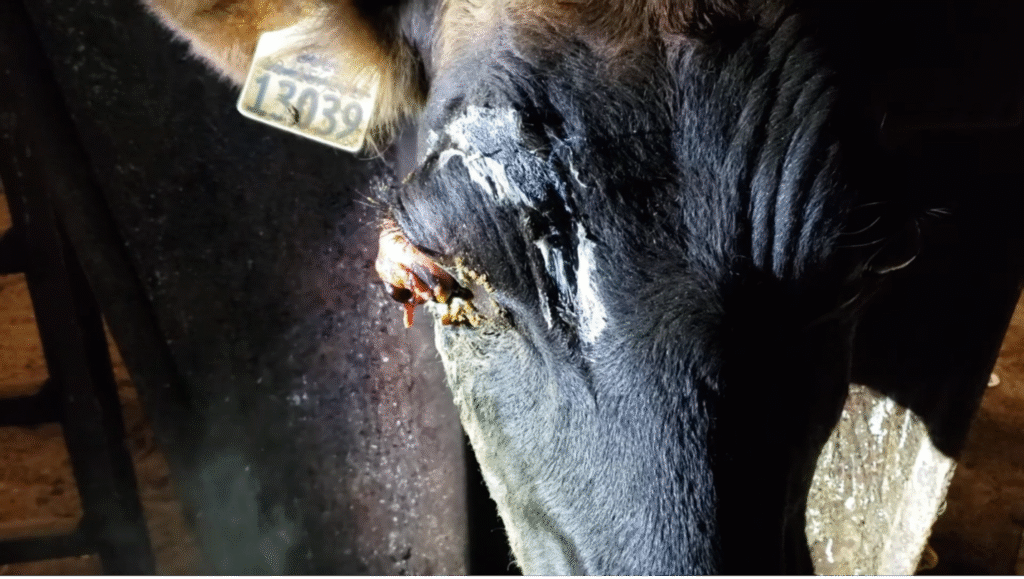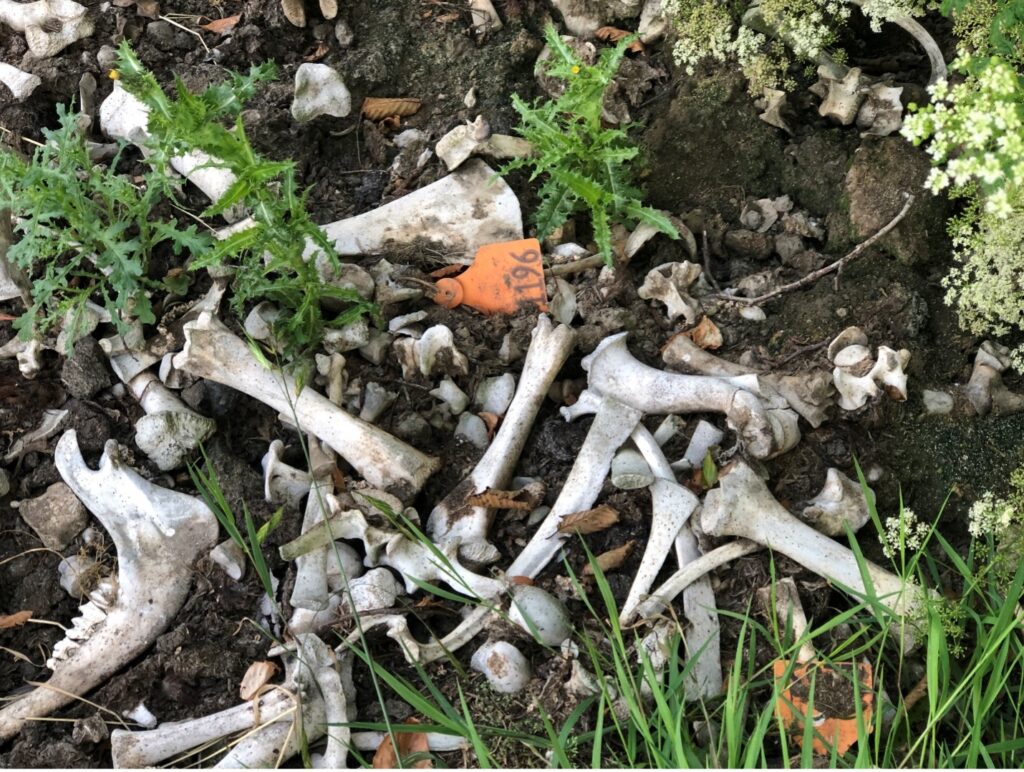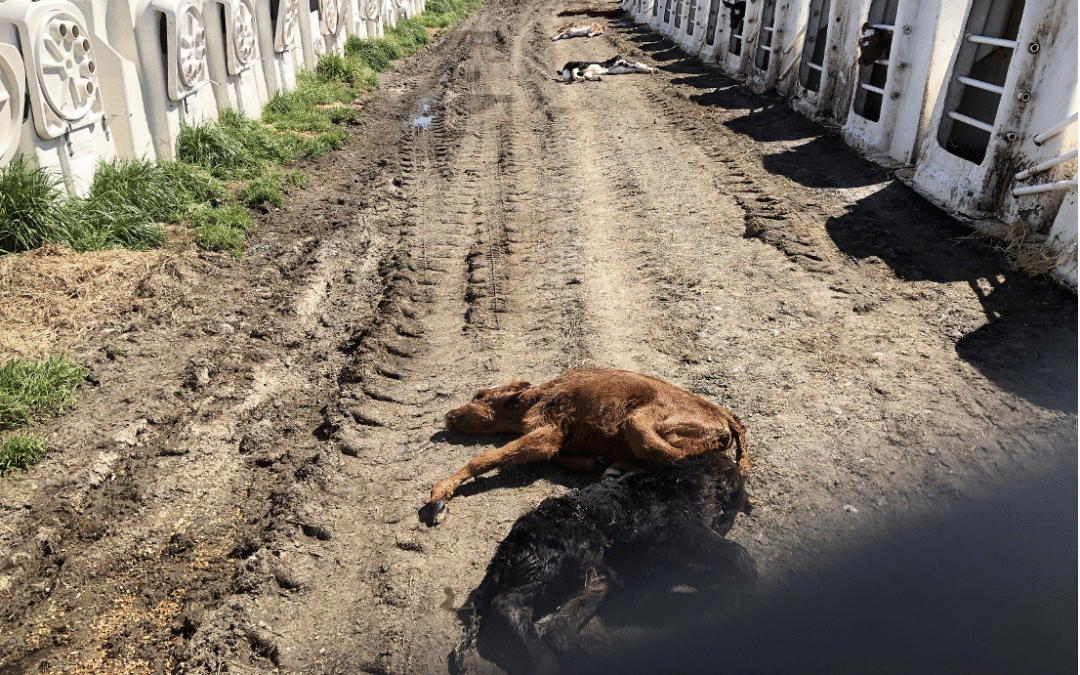
Dairy brand’s horrific animal abuse, use of illegal toxins missed by certifiers; no fines or penalties — even when caught by whistleblowers and confirmed by USDA
The skinny on the corruption at USDA’s organic program and largest certifier, CCOF:
1. There is an inherent conflict of interest (COI) with organic farms and processors choosing and compensating their own certifiers.
2. The only antidote to the COI is the congressionally mandated strict oversight (accreditation) by the USDA National Organic Program (NOP).
3. The chummy relationship between NOP regulators and certifiers has allowed widespread abuse: taking payola from their “clients,” certifying giant livestock factories and soilless hydroponic greenhouses, and fraud from untested imports.
4. The latest scandal concerns Alexandre Family Farms, an operation with multiple large California dairies selling products under an organic brand. Allegations by whistleblowers of widespread, grotesque animal abuse and use of toxins were investigated and affirmed — but unidentified over almost 2 dozen inspections by CCOF.
5. Even after the USDA confirmed the ethical and legal violations, Alexandre received no substantive penalties nor fines. This was all conducted in secret and never released to the public to serve as a deterrent against future scofflaws.
LA FARGE, WIS: The country’s preeminent organic industry watchdog, OrganicEye, just issued a scathing report charging the USDA with what it calls the “abject failure” to carry out the congressional mandate to protect the livelihoods of ethical farmers and shield consumers against fraud. Their whitepaper profiles the nation’s largest certifier, California Certified Organic Farmers (CCOF), which, despite numerous inspections over a period of years, failed to identify grotesque animal welfare violations and the use of banned toxins on California’s Alexandre Family Farm.
After whistleblowers and the animal welfare group Farm Forward filed formal administrative law complaints against Alexandre, both the USDA’s National Organic Program (NOP) and the California Department of Food and Agriculture (CDFA) investigated and initially found no violations of the organic standards.
A subsequent complaint, after adverse press coverage, was referred by the NOP to the certifier, despite the fact that CCOF had previously missed any signs of abuse. OrganicEye believes the referral was inappropriate given that the nature and chronology of the allegations could indicate incompetence and/or collusion on the part of the certifier.
CCOF’s ensuing investigation did confirm numerous violations of humane animal welfare requirements, including lifting injured animals with skid steer loaders, dehorning as many as 800 cows without pain medication, allowing sick animals to languish for weeks without care (some with severe eye disease as shown below), having infected teats cut off using a dirty pocketknife and without pain medication, widespread hoof rot and lameness, hundreds of cows being deprived of food for days causing a stampede that trampled 30-40 cows to death, and spraying cattle with diesel fuel to control flies.

In an ironic twist, former managers at the dairies told OrganicEye researchers that the stampede and mass-death event occurred as the principal farm owners, Blake and Stephanie Alexandre, were in Washington, DC, at the Organic Trade Association’s annual gala to receive their “Organic Farmer of the Year” award from industry lobbyists.
Viewer discretion is advised before reviewing the photo gallery compiled by Farm Forward due to the severity of the injuries to livestock and the multiple deaths illustrated.
“I have been a dairy policy analyst and an industry watchdog for approximately 35 years, and I’ve never seen anything remotely this widespread and long-term in terms of abuse,” said Mark A. Kastel, Executive Director at OrganicEye. “Some of our staff members have, literally, been in tears after viewing them.”
After receiving a complaint from a citizen whistleblower in 2022, the NOP passed the investigation on to California regulators, who found no violations. It should be noted that Mr. Alexandre has for more than a decade served on various advisory positions for the California Department of Agriculture.
Only after Farm Forward released their investigation, which was covered in a highly viewed article in The Atlantic, and submitted an additional complaint in 2024, did the NOP ask CCOF to investigate.
In May of 2025, Farm Forward obtained documents through a freedom of information (FOIA) request showing that Alexandre had entered a consent agreement with CCOF in which they admitted that many of the allegations in Farm Forward’s report, which they had previously vehemently denied, were true. Despite confirming that Alexandre had violated the law, neither CCOF nor the NOP applied any fines or substantive penalties beyond requiring correction of some problems, after the fact, and subjecting Alexandre to two additional inspections over two years.
It should be noted that OrganicEye has long criticized the NOP for failing to make enforcement actions public. “How can incidents like this serve as a deterrent to other would-be scofflaws if they are not announced to the public?” Kastel asked. “Although, with such minor enforcement penalties, I can see why the USDA might want to hide these incidents from public view,” he added.
Stephanie Alexandre spent 10 years on the CCOF Board of Directors and continues on one of its advisory panels. One of the board’s responsibilities was selecting management at the certification affiliate. “Ms. Alexandre was basically selecting the individuals responsible for inspecting her own farm,” said Kastel.
An unrelated legal complaint charging CCOF with illegal conflicts of interest, including accepting hundreds of thousands of dollars from major clients like Driscoll’s, Cal-Organics, and Earthbound Farms, was referred for investigation by the USDA Office of Inspector General.
Based on a summary of the “sweetheart deal” between CCOF and Alexandre, it appears that the certifier simply deferred to Alexandre’s denial regarding some of the charges. “Farm Forward could have proven they were true had the NOP responded to our offer to speak to them by phone,” said Andrew deCoriolis, Executive Director of Farm Forward.
Alexandre denied that cows sent to auction for slaughter had “low body condition scores, were injured, and some emaciated,” according to the NOP. Mr. deCoriolis responded by saying, “We would’ve been happy to provide numerous videos and still photos and connect them with eyewitnesses — and still would. These were animals that were illegally denied treatment with antibiotics or other drugs, in direct conflict with the law, to selfishly maintain their organic status.”
An additional formal legal complaint has now been filed with the NOP documenting new violations yet to be adjudicated, affording them the opportunity to reopen the Alexandre investigation. New charges include: farming on land that had toxic agrichemicals applied more recently than the minimum required three-year transition, shipping milk before all cows were managed on organic feed and without prohibited drugs for the required one-year, feeding animals conventional colostrum and silage, grossly overstocking free stall barns causing injury and illness, and the certifier, CCOF, “tipping-off” Ms. Alexandre of an impending “unannounced” inspection after a complaint was filed.
“We need testimony taken under oath regarding these matters since we have the allegation of a corrupt relationship between the certifier and the operators,” Kastel said. “Although we don’t have the ability to do that, we have interviewed five dairy professionals with first-hand knowledge of the Alexandre operations, and all of these new issues have been corroborated by multiple witnesses, photographic evidence, or other documentation.”
OrganicEye has now also sent a formal request to the USDA’s Office of Inspector General (OIG) alleging systemic corruption at the NOP and asking for a thorough investigation. A copy of the request was also sent to USDA Secretary Brooke Rollins, asking that she immediately take action to remediate the long-term problems at the troubled program, rather than waiting for the OIG to issue a report.
The NOP has previously been accused of favoring corporate agribusinesses that have invested in organic production, turning a blind eye to violations by “organic” livestock factories, illegal hydroponic (soilless) greenhouse produce production, and numerous examples of widespread import fraud.
“Through ‘regulatory capture’ during both Democratic and Republican administrations, agribusiness interests have degraded the working definition of the organic label, resulting in thousands of US family-scale farmers losing their livelihoods and American eaters/consumers being taken advantage of,” lamented OrganicEye’s Kastel.
The organization has created an action alert enabling organic stakeholders to convey their concerns to both the OIG and USDA Secretary, asking for prompt action.
-30-
MORE:
Certifications listed on the Alexandre Family Farm website include:

Please click here for an Infographic outlining the full dimension of the failure of organic and other certification schemes as well as guidance for identifying the true organic heroes in the marketplace.
Despite federal oversight, organic certification is not working much better than private “pay to play” certification schemes

Over the years, Alexandre’s operations were inspected dozens of times by their organic certifier, CCOF, and other private groups, some of which were compensated by the operation. Yet neither their certifier nor the private groups reported any deficiencies worthy of sparking enforcement actions (fully detailed in OrganicEye’s white paper). OrganicEye says they know of no other organic brand displaying as many private certification seals and endorsements on their website and packaging. They include:
California Certified Organic Farmers (CCOF), Alexandre’s accredited organic certifier, has certified the dairy operation since 2003 and are paid thousands, annually, by their “client.” OrganicEye’s Kastel has long contended that the only antidote to the inherent conflict of interest is the judicious accreditation program mandated by Congress and overseen by the National Organic Program (NOP). (The NOP’s performance in that regard has been criticized over the years by OIG, American National Standards Institute, and numerous NGOs.)
Certified Humane is compensated by their clients to inspect operations and allow their logo to be used on packaging.
Regenerative Organic Certified was started, in part, by the Rodale Institute, which Alexandre has financially supported. Representatives from some of the largest organically certified food companies sit on their Board of Directors. CCOF is one of 15 USDA accredited organic certifiers partnering with the Regenerative Organic Alliance (ROA) to do regenerative organic certification.
Cornucopia Institute removed Alexandre from their scorecard of organic dairies after the initial damning Farm Forward report was issued in 2024. However, over a year and a half later, Alexandre is still displaying Cornucopia’s “Top Rated” logo on their yogurt containers and website. And the dairy brand is still listed on their “independently owned” list of organic brands that Cornucopia promotes as the “gems in the marketplace.”
OrganicEye trusts that Cornucopia board and management will commence an aggressive internal review to ensure their lists are up-to-date and of value to the organic eater/consumer.
Real Organic Project (ROP) does not certify the Alexandre dairy operation but does certify their egg brand. The Alexandre website displays the ROP logo at the top of their certifications page without qualification — a practice Kastel suggests could be intentionally misleading — though it is noted farther down the page, buried in the text, that ROP certification applies to eggs only. OrganicEye is unaware of any complaints filed against Alexandre’s pasture-based poultry production, however the organization feels that, when the owner or management has been found to be unethical and operating illegally in any facet of their operation, they should be disqualified and considered untrustworthy.
Unlike most private certification schemes, OrganicEye states that they have generally great overall confidence in the ROP, which is volunteer-led by some of the country’s highest-integrity farmers.
OPT’s Certified Grass-Fed Organic Livestock Program™ designates a certain percentage of Alexandre labeled products as being 100% grass fed. CCOF is one of 14 certifiers partnering with Organic Plus Trust (OPT) to certify their grass-fed livestock program.
Savory Institute’s Land to Market promotes monitoring of soil health and fertility, carbon sequestration, hydrologic function, and biodiversity. There are no published standards. When Dean Foods/Horizon was under legal scrutiny for confining animals on their 4500-cow dairy in Paul, Idaho, they hired Savory as part of their damage control campaign. The person who spearheaded that project, a petroleum engineer with no discernible prior experience in the organic industry, would later chair the USDA National Organic Standards Board and go on to lead one of the largest corporate-friendly certifiers, Quality Assurance International.
Validus Verification Services, a division of organic certifier Where Food Comes From, Inc., is a leading auditing company for the conventional pork, dairy, egg, and poultry industries – not commonly the dairy industry. It is unknown what standards they are verifying. Validus was involved in the greenwashing campaign undertaken after the investigation into Aurora Dairy, the country’s largest “organic” factory farm operator, in 2006. Validus was also involved in the damage control campaign after Fairlife-branded milk, now owned by Coca-Cola, was implicated in a series of abuse incidents.
Factory farm professional in charge of evaluating organic dairies
In an Orwellian twist, the first USDA National Organic Program investigation into whistleblower complaints against Alexandre — which found no wrongdoing — was headed by NOP Lead Compliance Officer Emily Prisco. Ms. Prisco is a former employee of both Dean Foods/Horizon and Aurora Organic, two of the largest “organic factory farm” operators, each managing many thousands of head of cattle at numerous locations. Both of her dairy employers are very active members of the industry lobby group, the Organic Trade Association.
OrganicEye’s Kastel previously filed formal legal complaints against Dean/Horizon, Aurora, and a 10,000-cow dairy that shipped to Horizon, located in Pixley, California.
Aurora was found by the USDA to be in “willful” violation of 12 tenets of the organic standards. Like Alexandre, they were put on probation and allowed to continue without fines or substantive penalties. However, they were forced to settle a multimillion-dollar class action consumer fraud legal settlement, just as Alexandre is now facing.
Ms. Prisco was the Organic Stewardship Specialist at Aurora’s Platteville, CO, facility from 2006 to 2008, where she managed USDA National Organic Certifications for farms, oversaw audits, and maintained compliance.
“This clearly illustrates the skewed point of reference at the NOP,” said Kastel. “Within the organic dairy community, it is widely believed that these industrial-scale dairies, each milking 1500-15,000 cows, are violating both the spirit and letter of the law. Yet NOP management puts someone with that background in charge of critiquing the ethical and legal behavior of all organic dairies in the US!”
National Organic Program — lack of objectivity
OrganicEye has long contended that the NOP engages in a much too friendly relationship with the certifiers they are charged with supervising.
“I wish I was making this up,” said Kastel. “The NOP is actually the largest funder of the industry trade group, the Accredited Certifiers Association or ACA (certifiers are generally for-profit business enterprises).
This relationship led to ethics violation charges being filed against the former NOP director. He retired shortly thereafter.

